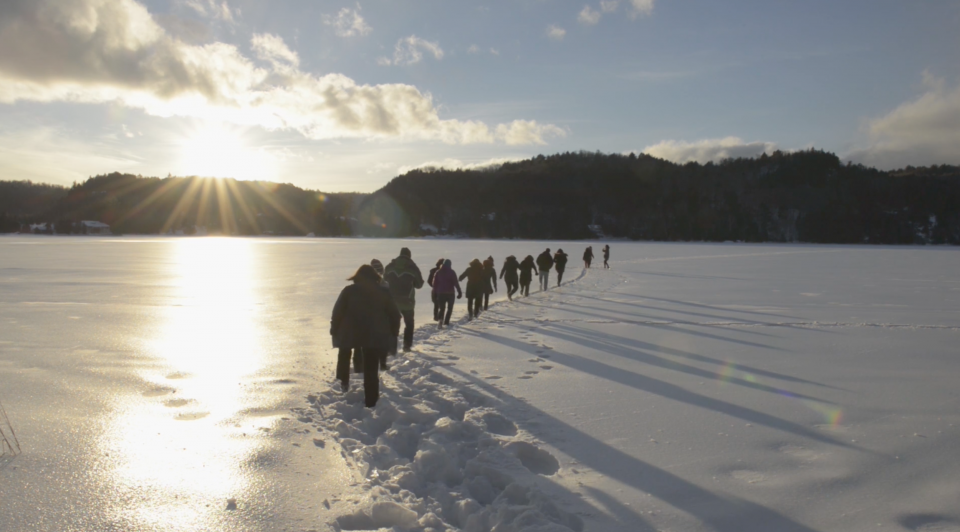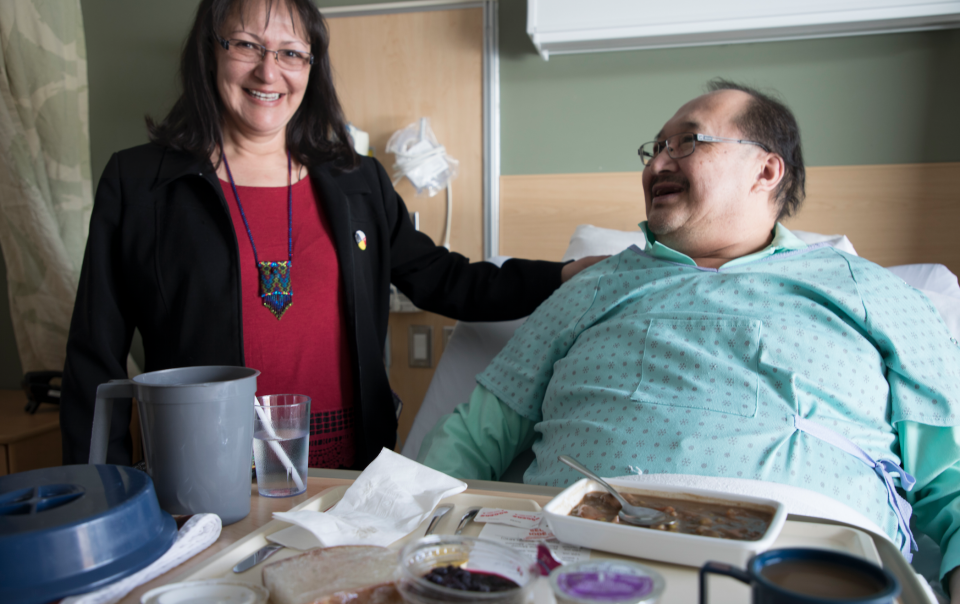Achieving Greater, Together, through Food in Health Care
By Cheryl Hsu, Dan Munshaw and Kathy Loon

Photo Caption: Dan Munshaw (left) and Kathy Loon (right) are both innovators in Nourish, a national project aiming to elevate food as a fundamental part of health and healing in Canada.
When Dan Munshaw and Kathy Loon met for the first time at a wintry retreat centre in Quebec, they had no idea what to expect. Other than the fact that they had both been recruited as part of a national program around food in health care, the only thing they knew they had in common was that they were neighbours. While the other 23 cohort members represent hospitals from across Canada, from Haida Gwaii, British Columbia to Gander, Newfoundland, Dan and Kathy both come from North Western Ontario. Dan works as a Supply Manager for the City of Thunder Bay, and Kathy Loon works as the Traditional Programs Manager for the Sioux Lookout Meno Ya Win Health Centre (SLMHC). In the vastness of Treaty 3 and Treaty 9 in Northern Ontario, they counted as neighbours.
Dan and Kathy are participating members in Nourish: The Future of Food in Healthcare, a national movement of health care institutions across the country working to innovate around food in health care. Both individuals were unusual recruits insofar as they don’t come from a hospital food service and dietetic background like others: Dan isn’t an expert in designing menus or cooking food, but he’s passionate about the power of public procurement to create value in local supply chains. Kathy manages the traditional programming for SLMHC, which includes the Miichim (Traditional Foods) program, serving traditional foods like local moose, fish and blueberries to their patients.

“When you think about healing, you have to think of food as medicine. Food can provide comfort, and it can provide healing physically.”
— Kathy Loon, Traditional Programs Manager, Sioux Lookout Meno Ya Win Health Centre.
Warming themselves next to the fireplace at the retreat, Kathy had long conversations with Dan and other innovators about why culturally appropriate foods need to be served to patients when they are healing — when Indigenous patients can eat a comforting bowl of moose stew cooked traditionally the way their Kookums (grandmas) make it, it supports their physical, emotional and spiritual healing. It makes them feel like their culture is respected and valued.
Dan was profoundly inspired by Kathy’s passion and dedication. He knew that his region in Northwestern Ontario was home to 22% of the Indigenous population of Canada, living in both urban and remote settings. Over the course of the Nourish program, Dan was determined to serve Indigenous and traditional foods at the City of Thunder Bay’s stadiums and arenas, by buying foods like wild fish from traditional suppliers, growers and harvesters.
“City Supply is striving to raise awareness, explore opportunities and engage with Indigenous suppliers. We are trying to leverage public spend to influence regional economic development and social contribution. “
— Dan Munshaw, Manager of Supply Management, City of Thunder Bay
When Dan and Kathy saw each other again over a year later at the next Nourish retreat in British Columbia, Dan shared wild venison in exchange for Kathy’s Chaga fungus. Their friendship was cemented through a powerful moment of collaboration when Kathy mentioned to Dan the hurdles the Ministry of Natural Resources and Michelle Beaulne, SLMHC’s Director of Corporate Support Services, were facing in establishing a food-sharing partnership. Many moose are confiscated by the MNR, explained Kathy, and rather than having them thrown out and wasted , Beaulne and the MNR were working on a process that would allow uninspected meat and wild game such as this to be donated to the hospital. But even with strong collaborative efforts between the two parties, change was slow coming. Due to an exemption written into the Ontario Food Premises Regulation 493/17, SLMHC is granted status to serve uninspected meats and wild game as part of their traditional foods program. They are one of the only hospitals in Canada permitted to do so. Kathy emphasized to Dan how these moose donations could impact the hospital and its patients and asked if there was any way he could help out.
Dan acted quickly: he first reached out to another First Nation group Red Rock Indian Band and told them that the hospital needed moose meat. They managed to pull together a lot of moose meat and arranged for it to be shipped to Kathy in the interim. However, Dan agreed with Kathy that they needed a longer-term solution cultivated with the MNR office, so he contacted past Provincial Ministers that he knew (including then-Thunder Bay-Rainy River MP Ken Boshcoff, now the City of Thunder Bay Mayor) and talked to them about SLMHC’s situation. This effort, combined with SLMHC’s ongoing communication and dialogue, finally cemented the food-sharing partnership between the MNR and the health centre. Not long after, Dan got an email from Kathy excitedly announcing that the MNR could now support the hospital by donating confiscated meat and wild game. With this new partnership, the Sioux Lookout Meno Ya Win hospital has a steadier flow of moose and wild game that has enabled them to double the amount of Miichim meals that they can serve to the patients on a weekly basis.
“Kathy and I have built a friendship: I have wild venison and she’s
bringing me Chaga mushrooms – this is a relationship that is based
on mutual trust.”
— Dan Munshaw

Photo Caption: Kathy Loon, Manager of Traditional Programs (left) sharing a Miichim meal of moose stew and stewed blueberries with a patient at Sioux Lookout Meno Ya Win Health Centre.
These critical moments of collaboration, as well as the friendships built through trust and mutual support, are the backbone of the Nourish community, where innovators across Canada work tirelessly to advocate for food to be valued as part of health and healing in the health care sector. The group wants to shift the culture from one where food is just seen as an ancillary cost centre in hospitals, to a mindset that embraces the opportunities around food to enhance patient experience, anchor community wellbeing, and promote planetary health.
Currently, four billion dollars of the health care budget is spent annually to serve meals to patients and residents three times a day. This may seem like a lot, but it is still only 0.02% of the total 242 billion dollars of health care spending in Canada. This speaks to enormous potential in the purchasing power of healthcare institutions, where they can intentionally choose to procure food from and build relationships with local farmers and Indigenous suppliers in order to create more social, economic and sustainable value in the supply chain.
As part of his work in the Nourish leadership program, Dan Munshaw has been one of the leaders working on a national collaborative project focussed on developing values-based language that is policy compliant to be integrated as criteria into Request for Proposals (RFPs). The goal is to create a publicly available tool that public institutions can use as in order to shift procurement towards healthier and more sustainable food purchasing.
The values-based procurement project is just one out of five other national Nourish projects. The others include testing a national tool to measure and benchmark the patient food experience across Canada; a Guide for Sustainable Menu development in hospital food service;and policy efforts to advocate for baseline measures around local food purchasing to be included in the Ontario Local Food Act. A final project that Dan and Kathy both also participate in is one to build capacity in Canada’s health care sector to deliver traditional food programs in a culturally safe way, as part of a broader national project toward reconciliation. This project is focused on engagement with local community members and elders, and has a focus to understand how to best address deeply embedded colonial mindsets around food and wellbeing. The team sees food as medicine, and as a pathway to reconciliation.
Nourish is building a movement where the true value of food can be recognized as fundamental to health and healing. Dan and Kathy’s relationship is emblematic of the type of collaboration and innovation that Nourish is intent on weaving into the Canadian health system. Their achievements are evidence of the value of shifting the health system as neighbours and as friends, and finding ways to collaborate in order achieve greater outcomes, together.
© 2024 Sioux Lookout Meno Ya Win Health Centre